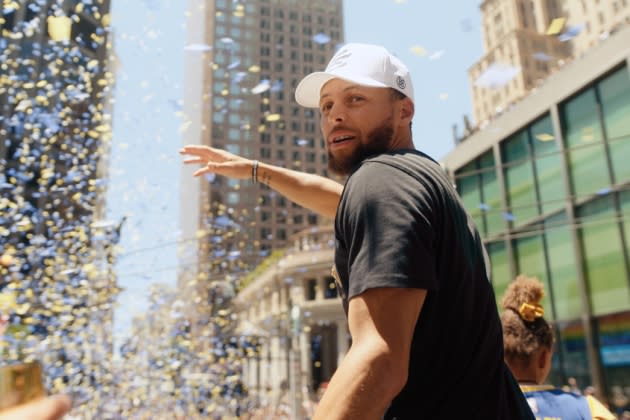Ryan Coogler and Peter Nicks on Making a Doc About Steph Curry: ‘We’ve All Been, at Some Point in Our Lives, Overlooked and Underrated’
- Oops!Something went wrong.Please try again later.
- Oops!Something went wrong.Please try again later.

Ryan Coogler and Peter Nicks met in 2012 when Coogler was making “Fruitville Station” and needed help securing access to a location. Nicks, who was finishing his first feature documentary, “The Waiting Room, came to the rescue. Nine years later, Cooglar hired Nicks to run the nonfiction arm of his production company Proximity Media, which has a five-year overall exclusive television deal with The Walt Disney Co.
The fruits of that partnership have been revealed this summer. Proximity’s first feature documentary, “Anthem,” which Nicks directed, was released in June on Hulu. On July 21, Nicks’ “Stephen Curry: Underrated” will debut on Apple TV +. The doc, which chronicles the NBA star’s life and career, made its world premiere at the Sundance Film Festival in January.
More from Variety
“When I heard that Ryan was starting a company, I put together this little PowerPoint presentation and pitched him,” remembers Nicks. “I said, ‘Hey, are you guys going to support nonfiction?’ I don’t know how deeply they were thinking about it, but I really felt that under an umbrella like Proximity, nonfiction could not only flourish, but we could do a lot to help grow nonfiction stories and present them to mainstream audiences.”
Variety spoke to Coogler and Nicks prior to the SAG/AFTRA strike about consolidation, Steph Curry, and whether or not Coogler would ever direct a documentary.
Has all of the corporate consolidation going on impacted Proximity?
Coogler: I think it’s like affected everybody. It’s a tough time. We have been fortunate to be putting movies out right now. But I think everybody’s been touched.
Nicks: When Proximity was born, the theatrical marketplace was the focus of many people’s business model. Definitely, for me as a nonfiction filmmaker, I saw the viability of the theatrical marketplace starting to explode. Now all of a sudden, that’s been turned upside down. But at the same time, we have far more people making documentaries. We have people who typically only work in fiction who are seeing the power of non-fiction storytelling and going back and forth between the mediums. You’re starting to see innovation in the nonfiction space. So, ultimately, if we are telling powerful stories, the business models are going to shift and find new ways of connecting those powerful stories with audiences.”
Ryan, would you ever direct a documentary?
Coogler: Yes. Totally. I’m open to anything. But it’s got to be the right time. (Narratives) and documentaries are too very different mediums. To do something that you haven’t done before often takes more time. With “Underrated,” we needed a master documentary filmmaker who knew what he was doing. And that was Pete.
Peter, what appealed to you about making docu about a sports star?
Nicks: As a company, we want to be really mindful about every project that we do, whether it’s a Marvel superhero movie or a documentary. What is the connection between the teller and the subject? When we were first approached about this project, I had to ask myself, why would I do this? And could I do it justice? I am the same height as Steph. I’m mixed race like him. We were both born in Akron, Ohio. But beyond those odd coincidences, I personally relate to the idea of being underrated. I think that opened my eyes to a very powerful universal theme in the movie, which is this notion that we’ve all been, at some point in our lives, overlooked and underrated.
Peter a few years ago, you completed your trilogy about Oakland public institutions with “Homeroom,” which is about Oakland High School’s class of 2020. The other two films in the trilogy, “The Waiting Room” and “The Force,” were both made with PBS funds. What was it like to work with a Apple TV+ budget?
Nicks: Let’s not get carried away. “Underrated” wasn’t radically much more money than I had to work with on “Homeroom” (Hulu). It was a little bit more, but it wasn’t like radically more. Nonfiction as a genre has inherently lower budgets because they don’t tend to make as much money, and the audiences tend not to be as big. So, for me, I’m always thinking primarily about the story. Is the story worth telling? And how do you tell the story? That’s going to lead to an appropriate budget within limits.
Best of Variety
'House of the Dragon': Every Character and What You Need to Know About the 'Game of Thrones' Prequel
25 Groundbreaking Female Directors: From Alice Guy to Chloé Zhao
Sign up for Variety’s Newsletter. For the latest news, follow us on Facebook, Twitter, and Instagram.
